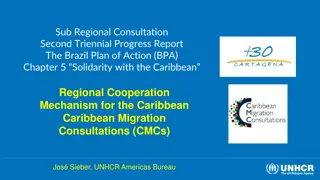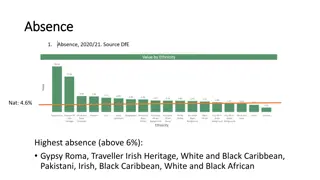
Dedicated Service to the Caribbean Region
A regional center dedicated to preventing marine pollution, promoting international standards, and fostering cooperation among Caribbean nations.
Download Presentation

Please find below an Image/Link to download the presentation.
The content on the website is provided AS IS for your information and personal use only. It may not be sold, licensed, or shared on other websites without obtaining consent from the author. If you encounter any issues during the download, it is possible that the publisher has removed the file from their server.
You are allowed to download the files provided on this website for personal or commercial use, subject to the condition that they are used lawfully. All files are the property of their respective owners.
The content on the website is provided AS IS for your information and personal use only. It may not be sold, licensed, or shared on other websites without obtaining consent from the author.
E N D
Presentation Transcript
Consensus and Coordination - A Quick Overview Ashvin Goel Electrical and Computer Engineering University of Toronto ECE 1724, Winter 2020 1
Common Tasks in Distributed Systems Coordination: group of processes coordinate their interactions for: cluster management, service discovery, failure recovery, updating joining nodes Configuration management: save, use configuration values Synchronization: locking, barriers Leader election: select leader, let others know about leader Group membership: get list of current members Replication: replicate data (passive) or tasks (active) Provides fault tolerance (allows handling replica failures) Improves latency (clients can access close by replica) Improves performance (clients access different replicas) 2
Coordination and Replication Failures in distributed systems are common Need coordination in the presence of failures So need both coordination and replication 3
Key Goal of Replication Ensure that clients are unaware of replication, observe a single, highly-fault tolerant machine Replicated servers, service doesn t fail Single server, service can fail Requires ensuring replica consistency Client reads latest data, immaterial of which replica it accesses 4
Types of Replication Primary-Backup State Machine Replication 5
Primary-Backup One primary replica executes all operations issued by the clients Primary replica pushes state updates to the backup replicas Backups apply state updates in the same order as primary If a primary fails, a backup takes over and becomes primary Requirements: Agreement: There should be only one primary at a time 6
State Machine Replication Clients issue deterministic commands to any replica Different clients may issue requests to different replicas concurrently All replicas execute all the commands, and in the same order, producing a consistent reply Concurrent requests can be executed in any order Requirements: Initial state: All replicas start in the same state Determinism: All replicas receiving the same input on the same state produce the same output and resulting state Agreement: All replicas process inputs in the same sequence 7
Consensus General distributed systems problem of agreement among a number of processes for a single data value in the presence of failures Requirements: Termination Eventually, every process decides some value Integrity If all processes propose the same value, then any process must decide this value Agreement Every process must agree on the same value 8
Consensus Key to solution: consensus from majority of participants Avoids split brain issues Core problem is correct failure sensing is not possible E.g., if we use a timeout to detect and remove a faulty leader, it may still believe it is a leader Using a majority vote ensures correctness Allows handling network failures With 2f+1 participants, f failures are possible, with no loss of availability 9






















